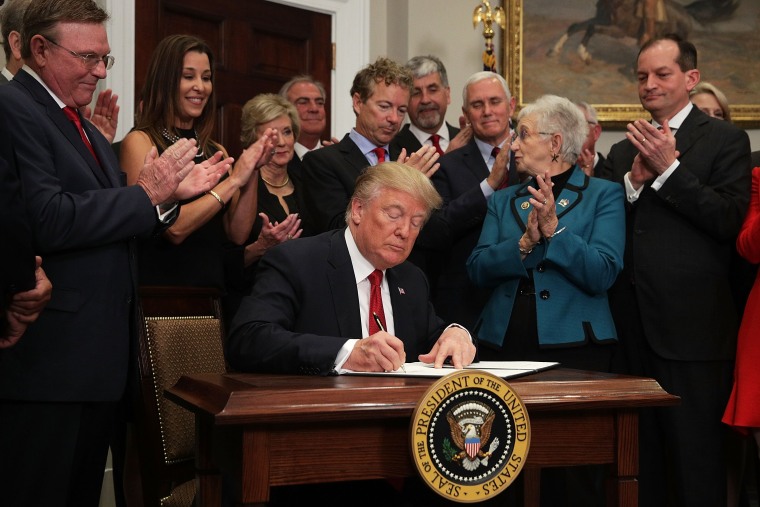One of the oddities of Donald Trump's decision to cut off cost-sharing reduction payments to private health insurers is that literally no one benefits from the move. Usually, at least someone benefits from Republican health care measures, even if the underlying idea is misguided, but in this case, everyone loses from the president's gambit on CSRs.
It takes effort to come up with a policy proposal this foolish. In one move, Trump has managed to hurt consumers, hurt insurers, hurt the health care market, and raise the deficit, creating a bizarre dynamic in which the country will pay more and get less. What's more, the Associated Press found that 70% of those who benefit from cost-sharing reduction payments live in red states.
In other words, the White House is not only making the health care system worse on purpose; it's also hurting parts of its political base.
The question, of course, is why. Steve Bannon, the president's former chief strategist, said over the weekend that Trump's goal is to "blow up" insurance markets, which is an amazing thing for him to admit out loud.
The president had a different explanation.
REPORTER: You promised that you would help people who are struggling. The CSR payment looks like it will hurt low-income people.TRUMP: The CSR payments, if you take a look at CSR payments, that money is going to insurance companies to prop up insurance companies.REPORTER: To help lower-income people.TRUMP: That money is going to insurance companies to lift up their stock price, and that's not what I'm about. Take a look at who those insurance companies support, and I guarantee you one thing: It's not Donald Trump.
The president is badly confused about his own actions. The money goes to insurers to cover out-of-pocket costs for lower-income Americans. Ending the CSR payments may hurt insurers stock prices -- something Trump was especially excited about over the weekend for reasons he didn't explain -- but it also directly hurts those who benefit from the payments, while indirectly hurting everyone through increases in premiums.
The list of critics of the president's ridiculous decision isn't short -- and it includes plenty of Republicans.
Sen. Susan Collins (R-Maine) explained yesterday that Trump is adversely affecting "the ability of vulnerable people to receive health care." Nevada Gov. Brian Sandoval (R) added, "It's going to hurt people. It's going to hurt kids. It's going to hurt families. It's going to hurt individuals. It's going to hurt people with mental health issues. It's going to hurt veterans. It's going to hurt everybody." Some House GOP moderates echoed the same sentiment.
The Washington Post's Greg Sargent raised an important point the other day, explaining that Trump may think he's putting Democrats in a difficult position, but it's really the White House's ostensible Republican allies who are suddenly in a jam.
[T]he pressure on Republicans to do that will be intense. The Washington Examiner recently reported that vulnerable House Republicans worry they could have a major political problem on their hands if these payments are stopped, because it could harm large numbers of people in their districts. As it is, millions are enrolled in plans with cost-sharing reductions, which pay money to insurers to subsidize out-of-pocket costs, and if they are halted, insurers could exit the markets, further destabilizing them and leaving millions without coverage options. Tellingly, influential House Republicans such as Reps. Tom Cole (Okla.) and Greg Walden (Ore.) have called for Congress to appropriate the payments.
Over the weekend, groups representing doctors, hospitals, insurers, and businesses -- including the U.S. Chamber of Commerce, a traditional Republican ally -- all collectively urged Congress to make the CSR payments Trump decided to end.
In theory, there's already a vehicle to make that happen. Sens. Lamar Alexander (R-Tenn.) and Patty Murray (D-Wash.) have been working for weeks on a bipartisan compromise that would extend CSR payments and prevent the hardship the president seems so eager to impose. In other words, there's a compromise waiting in the wings to "fix" the problem.
The fate of the bipartisan deal, however, remains very much in doubt: on Friday, the White House said Trump opposes the compromise, too.
